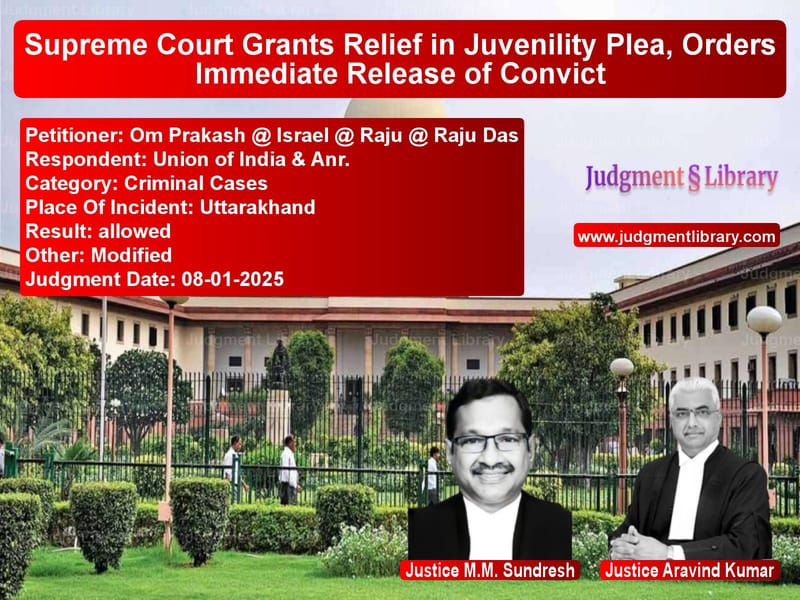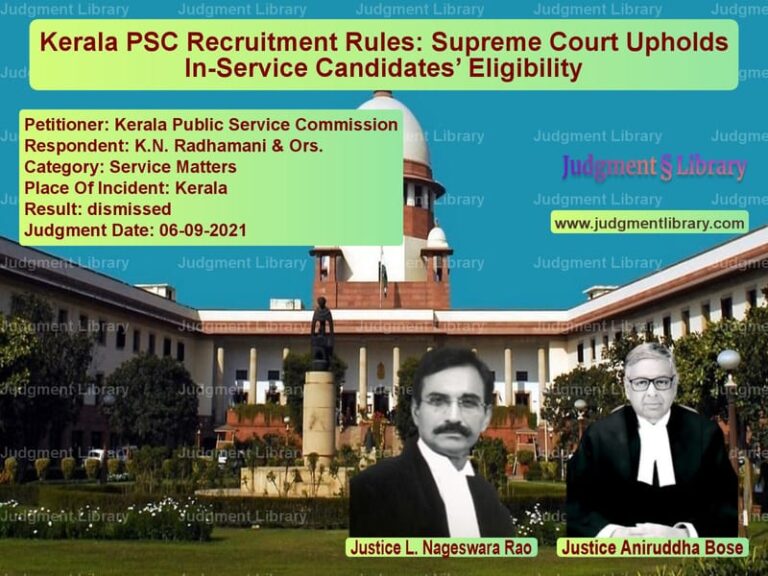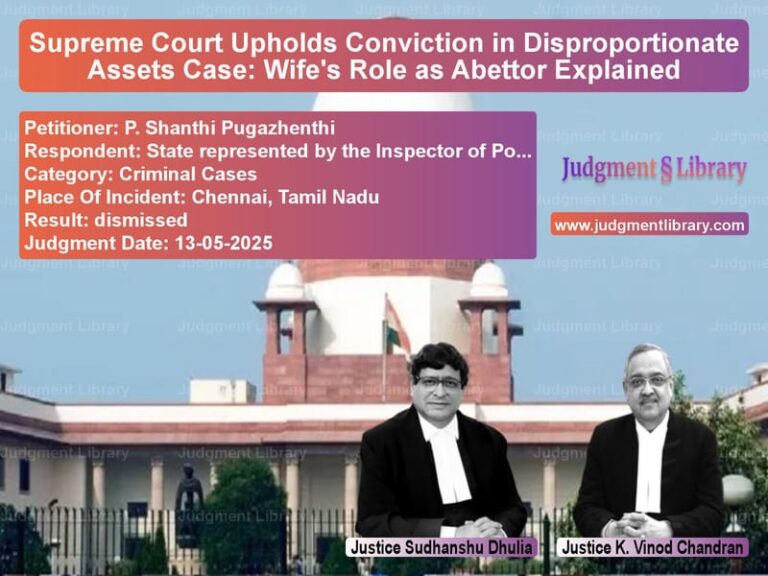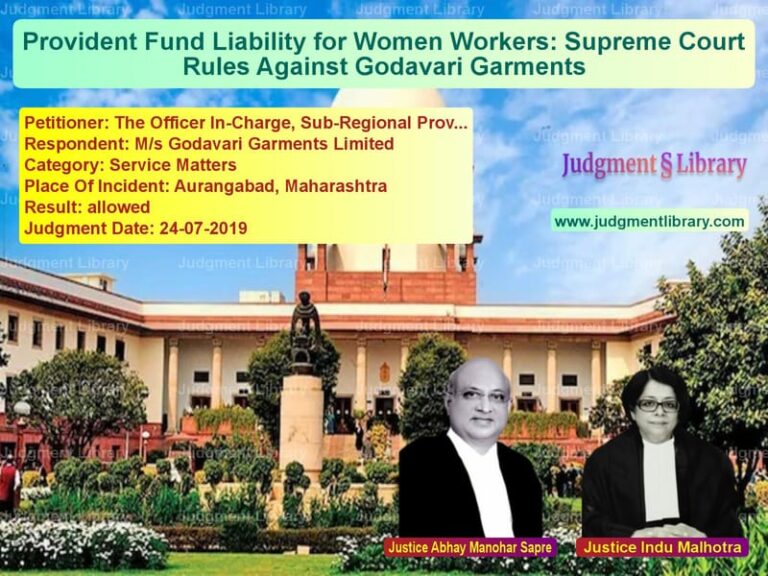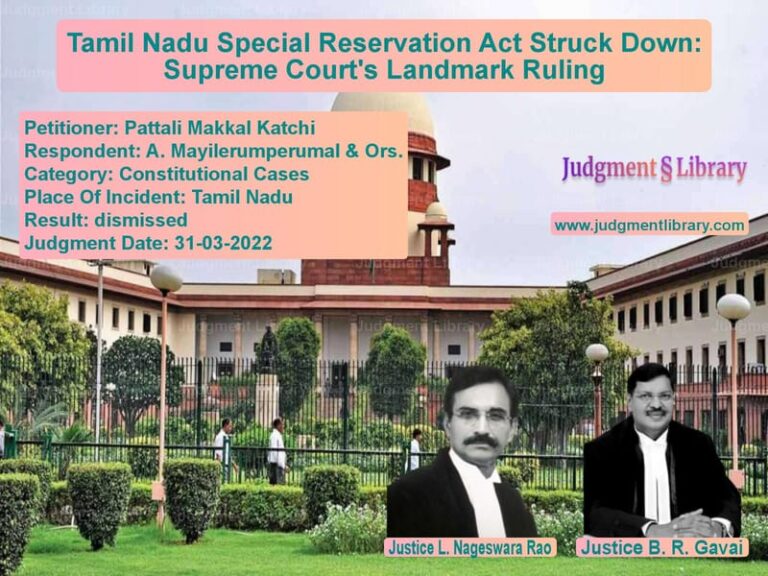Supreme Court Grants Relief in Juvenility Plea, Orders Immediate Release of Convict
In a landmark ruling, the Supreme Court of India in Om Prakash @ Israel @ Raju @ Raju Das v. Union of India & Anr., granted relief to the appellant by recognizing his plea of juvenility. The Court directed his immediate release after finding that he was a minor at the time of the offense. The judgment emphasized the fundamental principle that the plea of juvenility can be raised at any stage of legal proceedings, even after final disposal of the case.
Background of the Case
The appellant, Om Prakash, was convicted for an offense committed on November 15, 1994, and sentenced to death by the Trial Court. The conviction was upheld by the High Court and later by the Supreme Court. A subsequent mercy petition led to the commutation of his death sentence to life imprisonment with a condition that he would not be released until he reached 60 years of age.
The appellant consistently claimed that he was a juvenile at the time of the offense. His plea of juvenility was raised at various stages, but courts failed to conduct a proper inquiry as mandated under the Juvenile Justice (Care and Protection of Children) Act, 2015.
Key Legal Issues
- Whether the plea of juvenility can be raised after the final disposal of the case.
- Whether the constitutional courts have a duty to review past errors in cases involving juvenile offenders.
- Applicability of the Juvenile Justice (Care and Protection of Children) Act, 2015, retrospectively to provide relief to the appellant.
Arguments by the Appellant
- The appellant argued that he was 14 years old at the time of the offense and was entitled to protection under the Juvenile Justice Act.
- He contended that his date of birth, as recorded in school documents, confirmed that he was a minor.
- He pointed out that the judicial system had consistently failed to recognize his plea of juvenility despite repeated attempts.
- The appellant relied on previous Supreme Court rulings that established the principle that juvenility claims can be raised at any stage, even post-conviction.
Arguments by the Respondents
- The respondents opposed the plea, arguing that the case had reached finality and the appellant had already been granted relief through a commutation of sentence.
- They contended that the appellant’s plea was merely an attempt to reopen a settled matter.
- The prosecution further submitted that the ossification test alone could not be the basis for determining the age of the appellant.
Supreme Court’s Observations
- “The judicial system is meant for the discovery of the truth, it being the soul of a decision. A plea of juvenility must be considered even after the final disposal of the case.”
- “When procedural law stands in the way of truth, the Court must find a way to circumvent it. The court has an obligation to ensure that constitutional protections are extended to juveniles, even at a later stage.”
- “Injustice has been inflicted at multiple levels by failing to conduct a proper inquiry into the appellant’s age. The Court must correct such errors to uphold the principles of justice.”
- “The evidence on record, including the school certificate, supports the appellant’s claim of juvenility. The State itself has conceded in its affidavit that the appellant was 14 years old at the time of the offense.”
Final Judgment
- The Supreme Court allowed the appeal and directed the immediate release of the appellant.
- The Court held that the conviction under the relevant provisions of the IPC would remain, but the sentence imposed beyond the upper limit prescribed under the Juvenile Justice Act was set aside.
- The Uttarakhand State Legal Services Authority was directed to facilitate the appellant’s rehabilitation and reintegration into society.
Conclusion
This judgment reaffirms the Supreme Court’s commitment to upholding the rights of juveniles in conflict with the law. It sets a precedent for ensuring that procedural lapses do not result in the prolonged incarceration of individuals who were minors at the time of the offense. The ruling highlights the judiciary’s proactive role in rectifying past injustices and providing a fair opportunity for rehabilitation.
Petitioner Name: Om Prakash @ Israel @ Raju @ Raju Das.Respondent Name: Union of India & Anr..Judgment By: Justice M.M. Sundresh, Justice Aravind Kumar.Place Of Incident: Uttarakhand.Judgment Date: 08-01-2025.
Don’t miss out on the full details! Download the complete judgment in PDF format below and gain valuable insights instantly!
Download Judgment: om-prakash-@-israel-vs-union-of-india-&-anr-supreme-court-of-india-judgment-dated-08-01-2025.pdf
Directly Download Judgment: Directly download this Judgment
See all petitions in Juvenile Justice
See all petitions in Custodial Deaths and Police Misconduct
See all petitions in Judgment by M.M. Sundresh
See all petitions in Judgment by Aravind Kumar
See all petitions in allowed
See all petitions in Modified
See all petitions in supreme court of India judgments January 2025
See all petitions in 2025 judgments
See all posts in Criminal Cases Category
See all allowed petitions in Criminal Cases Category
See all Dismissed petitions in Criminal Cases Category
See all partially allowed petitions in Criminal Cases Category

